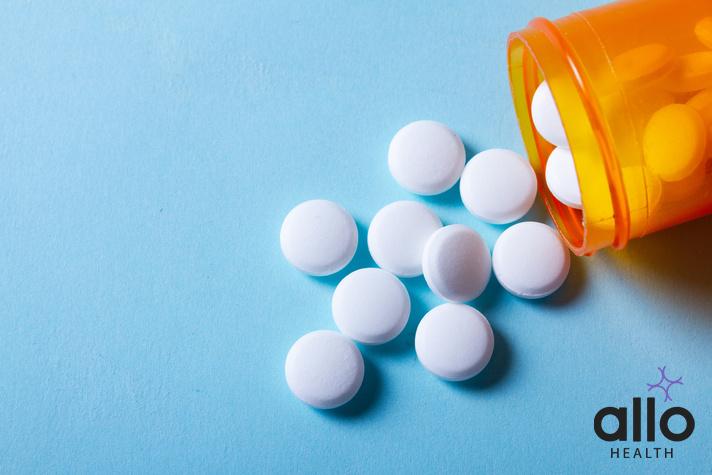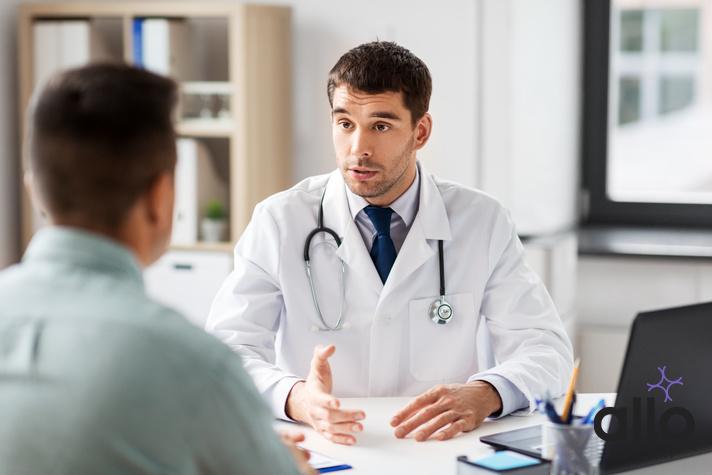Levofloxacin for STD: It’s Benefits and Risks

Allo Health is dedicated to personalized well-being, offering support and trusted information tailored to individual health goals. The platform emphasizes human-generated content, led by a distinguished medical team of experts, including physicians and sexual health specialists. Their commitment to credibility involves rigorous fact-checking, authoritative research, and continuous updates to ensure accurate, up-to-date information. Allo Health's unique approach goes beyond conventional platforms, providing expert-led insights and a continuous commitment to excellence, with user feedback playing a crucial role in shaping the platform's authoritative voice.

Dr. Raj. R holds an undergraduate medical degree from the Philippines, and has a bachelors background in Psychology. His experience working in the field of urology further brought his interest forward in working towards his passion of understanding the science of attraction, intimacy, sex and relationships. A key motto he practices by remains unprejudiced and non-judgemental care.
Why This Was Upated?
Our experts continually monitor the health and wellness space, and we update our articles when new information became available.
Updated on 16 February, 2024
- Article was updated as part of our commitment to diversity, equity, and inclusion.

"The following blog article provides information about a drug or brand name drug and its potential effects or benefits. However, it is crucial to understand that this information is intended for general educational purposes only and should not be considered a substitute for professional medical consultation. It is highly recommended to consult with a qualified healthcare professional before making any decisions regarding medication, treatment, or healthcare management.
Book consultation
Individuals have unique medical conditions, and the information provided in this article may not be applicable to everyone. Only a qualified healthcare provider can evaluate your specific medical situation, taking into account your medical history, conducting appropriate tests, and providing personalized advice and recommendations. They are equipped to make informed decisions tailored to your individual needs.
It is crucial to emphasize that self-diagnosis, self-medication, or disregarding medical advice can have serious health consequences. This article may reference specific brand names or drugs for illustrative purposes. Mention of these names does not imply endorsement, recommendation, or guarantee of their efficacy or safety. The choice of medication should be based on discussions and individualized guidance from a healthcare professional who has a comprehensive understanding of your medical condition.
"Levofloxacin is a widely used prescription drug known for its effectiveness in treating various bacterial infections, including sexually transmitted diseases (STDs). In this article, we will delve into the uses, potential risks, side effects, and alternative treatment options associated with levofloxacin for STDs.
What is Levofloxacin ?
Levofloxacin is an antibiotic with various applications in sexual health, particularly in treating sexually transmitted diseases (STDs).
- STD Treatment: Levofloxacin is prescribed to combat sexually transmitted diseases (STDs) such as chlamydial and gonococcal infections. It is particularly effective in treating these infections when used as per the infections treatment guidelines.
- Treat Chlamydial Infections: Levofloxacin can effectively treat chlamydia, one of the most common STDs. It helps clear the bacterial infection and prevent its transmission.
- Treat Gonococcal Infections: Levofloxacin is also used to address gonorrhea, another prevalent STD. Administered correctly, it can help eradicate the bacteria causing this infection.
- Alternative Treatment: In cases where patients are allergic to or cannot tolerate other antibiotics commonly used for STDs, levofloxacin may be recommended as an alternative treatment option.
- Follow-Up Therapy: In some instances, follow-up therapy with levofloxacin may be required to ensure the complete eradication of the infection and to prevent recurrence.
It’s important to note that the use of levofloxacin in sexual health should be under the guidance of a healthcare professional who can determine the appropriate dosage, duration of treatment, and monitor for any potential side effects or drug interactions. Patients should always follow their healthcare provider’s instructions for the best possible outcome in managing STDs with levofloxacin.
Mechanism of Action
Levofloxacin, a potent antibiotic, exerts its mechanism of action by targeting and disrupting the essential processes of bacterial cells, effectively combating various bacterial infections such as those causing STDs:
- Inhibit DNA Gyrase and Topoisomerase IV: Levofloxacin belongs to the fluoroquinolone class of antibiotics. It works by inhibiting the bacterial enzymes DNA gyrase and topoisomerase IV, which are critical for DNA replication and repair. This disruption prevents bacterial DNA from unwinding and replicating accurately.
- Interferes with DNA Synthesis: By inhibiting DNA gyrase and topoisomerase IV, levofloxacin interferes with the bacterial DNA synthesis process, ultimately leading to DNA strand breaks and preventing the bacteria from proliferating.
- Broad-Spectrum Activity: Levofloxacin’s mechanism of action allows it to combat a wide range of bacterial infections, including those associated with STDs such as chlamydial and gonococcal infections. It disrupts the DNA replication process in these bacteria, rendering them unable to multiply and spread.
- Prevent Future Infections: The effectiveness of levofloxacin in treating bacterial infections makes it a valuable tool in preventing the progression of STDs and reducing the risk of complications, such as pelvic inflammatory disease in women or acute epididymitis in men.
- Prescription Drug: Levofloxacin is a prescription antibiotic, and its usage should be carefully monitored by healthcare professionals to ensure appropriate dosing, treatment duration, and minimal risk of adverse effects, including effects on blood sugar levels and musculoskeletal side effects.
Levofloxacin’s mechanism of action involves inhibiting DNA gyrase and topoisomerase IV in bacterial cells, thereby disrupting DNA replication and synthesis. This broad-spectrum antibiotic is effective against various bacterial infections, including STDs, but should be used under the guidance of a health care professional to manage potential risks and side effects.
Benefits of Treatment with Levofloxacin

Levofloxacin offers several benefits compared to other treatments for bacterial infections, including STDs, making it a preferred choice in certain situations.
- Broad-Spectrum Antibiotic: Levofloxacin is an effective antibiotic with a broad spectrum of activity, capable of treating a wide range of bacterial infections, including chlamydial and gonococcal infections, which are common STDs. This versatility makes it a valuable option.
- Convenient Oral Levofloxacin Tablet Dosage: The availability of levofloxacin in convenient oral tablet form simplifies the treatment process for non-pregnant patients. This ease of administration enhances patient compliance.
- Shorter Therapy Durations: Levofloxacin often requires shorter therapy durations, typically 5 to 10 days, compared to some alternative treatments. This shorter course can lead to better adherence and quicker recovery.
- Prescription Antibiotic: Levofloxacin is a prescription antibiotic, ensuring that it is administered under the supervision of a healthcare professional. This minimizes the risk of incorrect usage and potential complications.
- Effective Against Resistant Strains: Levofloxacin can be effective against certain bacterial strains that may be resistant to other antibiotics, providing an essential alternative for cases of antibiotic resistance.
- Follow-Up Therapy: In cases where follow-up therapy is necessary to prevent recurrence or monitor treatment progress, levofloxacin offers a clear treatment plan, ensuring patients receive the care they need.
While levofloxacin has numerous advantages, it is crucial to consider individual factors such as allergies, potential side effects, and drug interactions. Consulting a healthcare professional for a personalized treatment plan and weighing the benefits against any potential risks is essential to make an informed decision regarding the use of levofloxacin or alternative treatment options.
Dosage and Administration

The dosage and administration of levofloxacin for STDs, specifically chlamydial and gonococcal infections, vary depending on the severity of the infection and individual patient factors.
- Standard Dosage: Levofloxacin is typically prescribed as an oral tablet in various dosages, with 500mg being a common starting point.
- Treatment Duration: Healthcare professionals may recommend a 5-day or 10-day regimen based on the specific infection and the patient’s condition, adhering to infections treatment guidelines.
- Completion of Therapy: Patients should complete the full course of treatment, even if symptoms improve before completion. This prevents the progression of the infection and reduces the risk of antibiotic resistance.
- Patient Follow-Up: Regular follow-up appointments with a healthcare provider are essential to monitor the effectiveness of the treatment and ensure no recurrence of the infection.
- Alternative Treatment Options: In cases where levofloxacin is contraindicated or if the patient experiences adverse effects, healthcare professionals may suggest alternative antibiotics or treatment options.
It is crucial to adhere to the prescribed medication schedule and seek medical advice promptly for STD diagnosis and treatment. Dosage and therapy duration should always be determined by a healthcare professional based on the specific patient’s condition and the type of infection.
Risks and Considerations
When considering levofloxacin for the treatment of sexually transmitted diseases (STDs), it’s essential to be aware of potential risks and considerations:
- Adverse Effects: Levofloxacin may cause adverse effects such as stomach pain, abdominal pain, and tendon pain. Patients may also experience blood sugar level fluctuations, blood pressure changes, and musculoskeletal side effects.
- Drug Interactions: Levofloxacin can interact with other medications, including nonprescription drugs and corticosteroid drugs. Inform your healthcare provider about all medications you are taking to prevent potential interactions.
- For Pregnant Women: Pregnant women should be cautious as there may be potential risks to the developing fetus. Consult a healthcare professional for guidance on alternative treatment options if necessary.
- Follow-Up Therapy: Completing the full course of levofloxacin therapy is crucial to prevent the progression of infection and potential antibiotic resistance. Attend all recommended follow-up appointments.
- Alternative Treatment Options: In cases of allergies or contraindications to levofloxacin, healthcare professionals may recommend alternative antibiotics or treatment options.
Being aware of these risks and considerations, and seeking guidance from a healthcare professional, is essential to ensure the safe and effective treatment of STDs with levofloxacin.
Other Treatment Options
When it comes to treating sexually transmitted diseases (STDs), levofloxacin is one of the effective antibiotics, particularly for chlamydial and gonococcal infections. However, there are alternative treatment options that healthcare professionals may consider, depending on factors such as the type of infection, patient’s medical history, and potential allergies or contraindications.
- Azithromycin: This antibiotic is commonly prescribed alongside levofloxacin for treating chlamydial infections. It offers an alternative regimen, and the choice between azithromycin and levofloxacin depends on various factors.
- Doxycycline: For patients who cannot tolerate or are allergic to levofloxacin, doxycycline is another option for treating chlamydial infections. It is available in oral therapy forms.
- Ceftriaxone: In cases of gonococcal infections, ceftriaxone may be recommended in addition to levofloxacin or as an alternative treatment. It can be administered as an injection.
- Lab Tests and Patient Follow-Up: Regular monitoring through lab tests and patient follow-up appointments are crucial to assess the effectiveness of treatment and ensure the infection has been successfully treated.
It’s essential to consult with a healthcare professional who can consider the patient’s specific medical condition, potential risks, and drug interactions to determine the most appropriate treatment option for STDs.
Conclusion
Levofloxacin is an effective antibiotic commonly used for the treatment of various bacterial infections, including STDs like chlamydial and gonococcal infections. However, it is crucial for patients to be aware of potential risks, side effects, and drug interactions associated with this medication. Always seek medical advice and follow prescribed therapy durations to ensure the best possible outcome for your health. If you suspect an STD, consult a healthcare professional for proper diagnosis and treatment.
Most Asked Questions
-
What is levofloxacin, and how does it work for STDs?
Levofloxacin is a medicine that helps fight infections caused by bacteria, including some sexually transmitted diseases (STDs). It works by killing the harmful bacteria in your body.
-
Are there any side effects I should be worried about when taking levofloxacin?
Yes, there can be side effects, like stomach pain or changes in your blood sugar or blood pressure. If you experience unusual symptoms or discomfort while taking levofloxacin, it’s important to talk to your healthcare provider.
-
How long should I take levofloxacin for STD treatment, and why is it essential to complete the course?
The duration of your treatment will depend on your specific infection, but it could be for 5 or 10 days. It’s crucial to finish all the medication, even if you start feeling better. This helps make sure the infection is completely gone and doesn’t come back.
-
Can I use something else instead of levofloxacin for STDs if I can’t take it?
If you can’t take levofloxacin due to allergies or other reasons, don’t worry. Your healthcare provider can suggest different antibiotics or treatments that will work for you. Always consult with them to find the best option for your health.






































